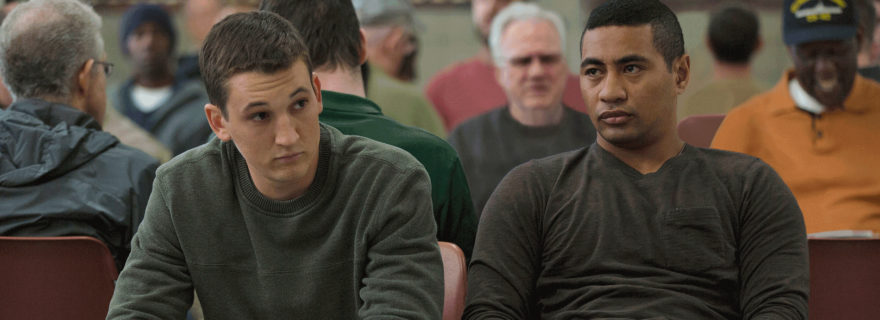'Thank You for Your Service'
Movie Rating:
3
‘American Sniper’ screenwriter John Hall makes his directorial debut with strikingly similar material. Fortunately, his follow-up focuses on the best aspects of that troubled war epic. Gone are the disturbingly narrow-minded battle scenes, and in their place Hall has doubled down on the unsettling reflection of war through PTSD. Based on a nonfiction book about the struggles of young men returning home from Iraq, ‘Thank You for Your Service’ is a moving, if muddled, exploration of relevant themes.
The film is a story of three friends – Adam Schumann (Miles Teller), Will Walter (Joe Cole), and Tausolo Aieti (Beulah Koal) – returning to their small town home life after serving time in Iraq. We get a brief glimpse of their traumatic action in the battlefield early, and then, aside from the requisite explanatory flashback near the finale, the story is all about how they deal with it. Unsurprisingly, it doesn’t go well. Aieti is outwardly fine and convinced that his time in the military was good for him, only to slowly watch that slip away. Will returns to an empty home, his fiancée long gone, and is unsure what to do with the ghosts of his former life. Adam at least as a wife (Haley Bennett) and children to welcome him home, but he’s so closed-off and quiet about what happened that it slowly puts a wedge in his family.
What follows is an earnest, thoughtful and emotional exploration of the effects of war on unprepared young men hoping to move on with their lives. Each character handles it differently – one dramatically and unpleasantly, while the other two respond in more drawn-out ways. How the story plays out has some issues. The big reveals are easy to predict. The ways the characters work through them (like stock counselling scenes) feel mundane. It’s all overly familiar. Yet that in and of itself feels like something potent about the film. ‘Thank You for Your Service’ can feel a bit clichéd and obvious because these stories are a painful constant in a country with active war. We know these pained expressions and story beats because they keep happening, which is a sad reality impossible to ignore while mumbling about the movie’s problems. There’s something to that, even if it wasn’t exactly one of Hall’s intentions while making the movie.
Instead, what Hall wanted to make was a muted drama about the effects of war, which is something of a welcome relief in an industry that often treats the war movie genre as propaganda and a recruitment tool. It’s a less theatrical exploration of the themes that Ang Lee covered in last years’s ‘Billy Lynn’s Long Halftime Walk’ and will likely be better received for it (even if I personally feel that makes it a lesser film). This is admittedly honest and painful stuff. Everyone treats it with reverence. There’s something stark to seeing a typically motor-mouthed and excitable performer like Miles Teller caught in dead-eyed stares of pain that he can’t hope to express verbally. That’s deliberate and clever casting. He’s good in the film, but it adds weight knowing that he’s holding back from his usual persona. Something feels wrong about seeing Teller in the role, and that registers.
The rest of the cast are all strong, but typically either too muted or too explosive in their emotions with little middle ground. That suits the theme but hurts the drama. A peculiar and noteworthy standout is Amy Schumer as the widowed wife of a soldier. She’s quite strong and naturalistic in her unexpected role, but sadly given too little to do. The movie could have used more of her wit and spark to verbalize unspoken themes in unexpected ways. But it’s not her story. This is about the men, and in context that’s what it should be.
‘Thank You for Your Service’ is a potent and moving movie. It covers important themes in sensitive and thoughtful manner. The only real problem is that we’ve seen this all before and John Hall doesn’t really have anything new or vital to say. That’s fine. It doesn’t mean that the story doesn’t need to be told, just that other movies have done it slightly better before and others will tell it again. This is the latest PTSD tale of woe. There will be more. Oddly, that might be the most unsettling part about the whole production.



